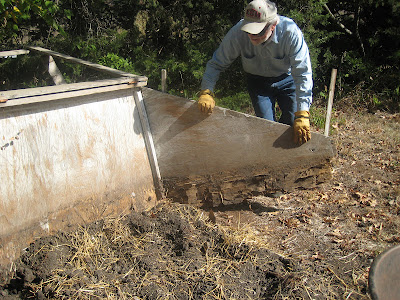A little work, a little investment and a little luck contribute to success in micro farming, even during a drought. We have a small garden, a cold frame, a chicken house with 14 chickens and a good neighbor, Laurie. Some days I'm amazed and a bit overwhelmed by the resulting riches.
Yesterday Dennis gathered nine eggs, eight of them laid in one nest. We have only five old hens but now the little chickens, who have grown into pullets in the five months since they hatched, have started laying eggs. As always, pullet eggs are small. We had six of them scrambled for breakfast along with whole wheat biscuits and homemade strawberry jam. We may be engaged in
micro farming, but two-thirds of our breakfast came from Paradise.
For supper last night we made BLTs with cottage cheese on the side. When I began to slice the tomato for our sandwiches I found almost no seeds, just deep red, juicy flesh.
This particular fruit came from the volunteer plant that came up in the corner of the tomato patch. Most tomatoes have an abundance of seeds, but here we have a tomato that is mostly flesh, a characteristic well worth preserving. Right away I decided to save the few seeds for next year's crop. After slicing the tomato I slid the juice and seeds onto a paper towel to dry overnight.
The seeds are so small I circled them with a pen. A big tomato that has only 21 tiny seeds would be a best seller. (I may have missed a few.) Maybe the seeds won't be viable, but next February I'll pick the them off the towel and stick them in some seed-starting medium to see what happens. Maybe it will prove to be a new variety. Maybe not, but that's the fun of this enterprise: seeing what would happen if...
Early this morning Laurie, who is half-owner of the little chickens, stopped by with a big bag of basil from her garden. This year her basil is growing exuberantly while ours is still very small. This year we have an abundance of tomatoes while hers aren't bearing. She gives us basil and we give her tomatoes.
Suddenly my morning schedule changed: I'll be making a modified version of pesto to freeze for winter cooking. If you have an abundance of basil, here's how: put a lot of basil leaves, several cloves of garlic and some olive oil in a food processor and whirl it all together. Spoon the paste into ice cube trays or small containers and freeze them. That's it. These ingredients are useful in soups, sauces and other dishes, such as Dennis' famous Crystal catfish. I'll post that recipe one of these days.
So, hey, we're having fun while hoping Isaac will bring us some rain.






























